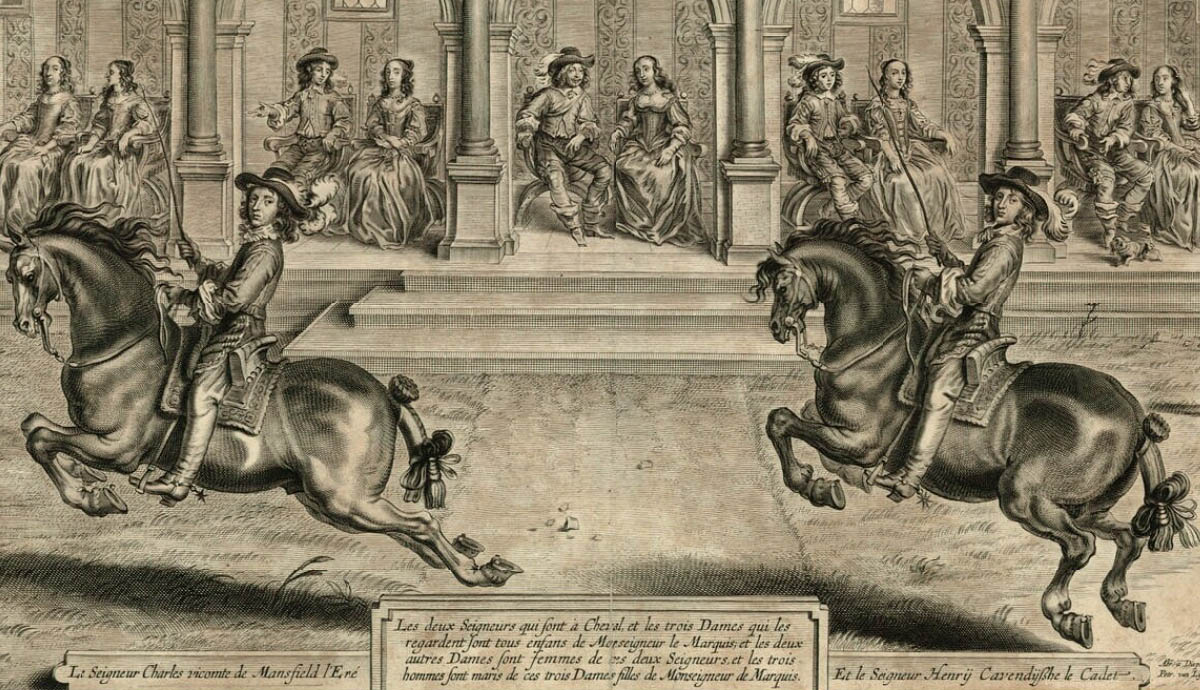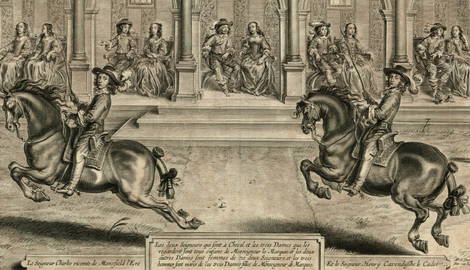
What would happen to us if no government existed? Thomas Hobbes claimed that life would be “solitary, poor, nasty, brutish, and short” in this state of anarchy. This has become widely known as the first interpretation of the state of nature in social contract theory, and Hobbes used this assumption to justify wide-ranging government powers to keep humans from harming one another. Hobbes’ philosophy of the social contract influenced other political theories by John Locke and Jean-Jacques Rousseau.
Who Was Thomas Hobbes?

Thomas Hobbes was born in 1588 in Wiltshire, England. He enjoyed childhood under the stable rules of Queen Elizabeth I and King James I but was exiled when the English Civil War broke out during the reign of King Charles I. Thomas Hobbes graduated from the University of Oxford in 1608 and became a tutor for the Cavendish family. Among his most influential students was William Cavendish (1590-1628), who later became the Second Earl of Devonshire.
The family’s patronage enabled Thomas Hobbes to write his most influential works, and they maintained a close tie to Hobbes for the majority of his life. The Cavendishes also patronized other influential thinkers and writers, such as Rene Descartes, Ben Jonson, and Sir William Davenant.
His connection with the Cavendish family provided Thomas Hobbes with the opportunity to travel, and to network with thinkers such as Galileo and Pere Mersenne. However, Hobbes’ proximity to their Royalist circle proved to be a challenge for him during the English Civil War that broke out in 1642.

By the end of 1640, after sensing anti-Royalist tension, Thomas Hobbes had already left England for Paris with a group of Royalists. Hobbes wrote his most influential work Leviathan during his time in Paris. It was published in 1651, the same year he permanently returned to England.
Context of Thomas Hobbes’ Most Influential Work: Leviathan

Leviathan‘s main concern is the divide between Church and state, and its topics of interest correspond directly to the contests of power that occurred during the English Civil War that saw King Charles I beheaded. Charles I became unpopular during what his opponents called the “Eleven Years Tyranny” (1629-1640), when he dissolved Parliament twice, married a Catholic Queen, and levied tax without parliamentary approval. In 1642, he failed to arrest 5 members of the House of Common on charges of treason and fled London. Subsequent negotiations between the king and parliament ended in failure, and cities and towns across the Kingdom began to divide themselves between Royalists and Parliamentarians.
Similar to the struggle between the King and Parliament, Leviathan questions what justifies a state, and what are the political obligations of the state to its people. Thomas Hobbes despised the prospect of war. Thus, in the post-Civil War turmoil, Leviathan suggests the presence of an absolute sovereign to restore order to chaos.
Leviathan made Thomas Hobbes unpopular for the rest of his life, earning him the nickname “The Monster of Malmesbury”. For one, many saw Leviathan as a royalist call to restore the Crown during the strongest years of the English Republic. Hobbes’ abandonment of the idea of the divine right of the kings also allowed critics to label him as an “atheist”. His advocacy for the absolute power of the sovereign essentially put the king above the church.
What Is the State of Nature?

In Leviathan, Hobbes begins by imagining a world without governments. He coined the term “state of nature” to describe a state of anarchy in which sovereign authority is absent. Hobbes theorized that, in the state of nature, everyone is equal in their ability to kill each other and life is “solitary, poor, nasty, brutish, and short”. It is a war “of every man against every man”.
There are three reasons conflicts appear in Thomas Hobbes’ state of nature: competitiveness, diffidence, and glory. These characteristics lead people to fight one another for material gains, safety, and reputation. Ultimately, people need to create a government to protect themselves from one another. This pessimism toward human nature sets Hobbes’ social contract theory apart from later theories by Locke or Rousseau.
The Laws of Nature

The laws of nature are the countering forces against the evils of human nature. Thomas Hobbes’ first law of nature is “a man is forbidden to do that which is destructive of his life, or taketh away the means of preserving the same; and to omit that, by which he thinketh it may be best preserved”. This means that a person should always try to keep themselves alive and safe.
Thomas Hobbes’ laws of nature also ensure the conservation of life across society. The second law of nature dictates that people will seek an agreement to obtain peace, which leads to the creation of the social contract.
The Social Contract: How to Escape a “Solitary, Poor, Nasty, Brutish, and Short” Life

Hobbes argues that the only way to escape the state of nature is to create a social contract. People create a contract by coming together in peace, agreeing to a set of laws, and creating a “sovereign”. The contract is made among the people to protect themselves from one another.
The sovereign’s role is to make the rules, mediate disputes, and enforce the contract. As the name suggests, the “sovereign” has absolute power and can’t be questioned by anybody. Hobbes argues that it is thanks to the presence of sovereignty that humans were able to build great civilizations.
This idea is best illustrated by the original book cover of Leviathan. The Leviathan is an artificial man who represents sovereignty. The cover shows a city with a giant king rising behind it, lording over the region. His armor is made up of bodies, representing the people who are part of the social contract.
Hobbes maintains that the sovereign has to be above everybody else since people will naturally try to fight those who are equal to them. He argues that absolute sovereignty is justified since the people consented to it while creating the social contract. As such he says, “to complain of injury done to you by the sovereign is to complain of injury you do to yourself.”
The only way the sovereign can be legitimately questioned is if they try to kill the people they rule over. Otherwise, they are free to stifle opposition or impose corrupt laws. Ultimately, Hobbes believes that people would always prefer a tyrannical sovereign over the gruesome chaos of the state of nature.
What Is Justice?

Justice in the Hobbesian sense is nothing more than adhering to a contract. Thomas Hobbes believes that humans have no moral compass unless there are predetermined rules to say what actions are good or bad. There is no morality in the state of nature. There is no contract without an absolute power to enforce it. Therefore, justice only comes into existence when the sovereign is established.
Application of Thomas Hobbes’ State of Nature Theory
Citizenship and society

Hobbes’ social contract theory marks a significant philosophical leap from the old concept of the divine right of the king. It is not god, but ordinary people who gave the king power. Consequently, it is up to the people to decide whether they want to obey their ruler.
This shouldn’t be mistaken for the support of democracy. Ironically, Hobbes was terrified of the power of the people, having lived through the beheading of Charles I. He spent his intellectual labor dissuading the people from overthrowing kings or starting revolutions.
Hobbes’ arguments become most contentious during times of social revolutions. His modern proponents will often cite tales of failed revolutions, such as in the majority of the Arab Spring Countries or the revolutions in modern Latin America.
International Relations

Hobbes’ idea of the state of nature is representative of the realist tradition in international relations. This tradition perceives states as existing in an anarchic state of nature, where they are free to attack each other. To an extent, the prevalence of conflicts and cooperation in human political history supports Hobbes’ theory of anarchy.
On the same note, the social contract is a metaphor for the international alliances among states. It is the case in international relations that the strongest political alliances are those created for protection against other states. For instance, the EU, often seen as the most successful international alliance, was created to mitigate the threat of Russia.
Just like Hobbes’ paranoia against revolutions, realists constantly feel the pressure of imminent warfare among states, especially in the age of nuclear power. The realist term “realpolitik” describes a diplomacy style that focuses on leveraging military power and containing the threats of war.
The Legacy of Thomas Hobbes’ Philosophy

Despite his important contributions to political philosophy, Hobbes’ distrust of human nature and pro-monarchy views are widely contested. Hobbes’ idea that humans are naturally bad neglects the complexity of human nature. Even newborn babies have been observed to have a sense of empathy and reciprocity. Hobbes also ignores the possibility that human morality can develop based on the environment in which humans grow up.
Proponents of democracy criticize Hobbes’ use of the social contract, which is popularly used to justify democracy, to promote absolutism. Nevertheless, he still laid down the earliest ideas of suffrage and consent for modern democracies.
These critiques of Hobbes are most prevalent in the philosophy of John Locke, whose version of the social contract theory embraces an optimistic view of human nature. Locke believes that humans do have morality and rights in the states of nature, but that conflicts arise when one person’s actions infringe on another person’s rights. Thus, people need governments to protect their rights, not to protect themselves from one another. Hobbes and Locke are commonly studied in comparison because they laid the groundwork for our modern understanding of the social contract and civil society.
Thomas Hobbes’ social contract theory, especially the idea of the state of nature, is a cornerstone of Western philosophy. It marks a philosophical shift from the divine right of kings to a social consensus as a legitimizing force behind state powers.
Despite the criticism of Thomas Hobbes’ pessimism, political philosophers still rely on Hobbes’s insight to interpret trends in governance and international affairs. Hobbes’ philosophy helps scholars ask important questions about power, limits, and the potential pitfalls of democracy.








